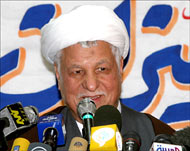Iran leader orders election ban review
Iran’s supreme leader has ordered the country’s constitutional watchdog to reconsider its decision to bar reformist candidates in next month’s presidential elections.

The Guardian Council, which vets the election candidates, rejected on Sunday all but one of the reformists who had registered to run in next month’s presidential elections.
Only six out of more than 1000 hopeful candidates were approved.
“It’s appropriate that all individuals in the country be given the choice from various political tendencies,” Ayat Allah Ali Khamenei said in his decree on Monday addressed to Guardian Council chief Ayat Allah Ahmad Jannati.
“Therefore, it seems that [the] qualification of Mr Moin and Mr Mehralizadeh should be reconsidered,” state television quoted Khamenei as saying, referring to the two most prominent reformists disqualified, Mostafa Moin and Vice President Mohsen Mehralizadeh.
Khamenei’s decree came after Iran’s main reformist party said it would boycott the 17 June presidential election after the disqualification of its candidate, which it called an attempt by conservatives to strengthen their grip on power.
Election ‘sham’
“The illegal disqualification of candidates will turn the upcoming elections into a vote which is not free, unjust, uncompetitive and … a sham,” Moin’s main backer, the Islamic Iran Participation Front (IIPF), said on Monday. “The IIPF … will not participate in these elections.”
However, it said it would take part if the ban were reversed.
|
“It’s appropriate that all individuals in the country be given the choice from various political tendencies” Ali Khamenei, |
Public reaction to the decision to bar the former education minister, an outspoken reformist who had promised to free political prisoners and tackle human rights abuses, was muted, with most Iranians resigned to a conservative win.
Of the six candidates deemed eligible to run, moderate conservative Akbar Hashemi Rafsanjani was likely to be among the biggest beneficiaries of Moin’s disqualification, analysts said, raising expectations that he was heading for a third term.
Apart from Rafsanjani, 70, who was president from 1989 to 1997 and favours better ties with the West and less state involvement in the economy, the panel approved just one moderate – reformist and former parliament speaker Mehdi Karroubi.
Leading candidates
The remaining four candidates – Mohammad Baqer Qalibaf, Ali Larijani, Mohsen Rezaie and Mahmoud Ahmadinejad – are all former members of the conservative Revolutionary Guards fiercely loyal to Supreme Leader Ayatollah Ali Khamenei.
Opinion polls suggest Qalibaf, 43, is Rafsanjani’s closest challenger. Analysts speculate that some of the other conservative candidates, possibly Rezaie and Ahmadinejad, will drop out before the election to consolidate the anti-Rafsanjani vote.
 |
|
Akbar Hashemi Rafsanjani is the |
The council did not announce its reasons for disqualifying Moin. In 2004, it barred hundreds of reformists from standing for parliament on the grounds that they had shown insufficient loyalty to Iran’s system of clerical rule.
Moin described the decision to bar him as “illegal, unfair and illogical” but said he would not appeal.
The liberal Sharq newspaper carried a front-page photograph of Moin, describing him as the election’s “big absentee”.
But there were few signs of a public rally to Moin’s cause.
“Why should I care?” asked Haleh, 40. “It doesn’t matter who we vote for, the system will still stay the same. I prefer not to vote at all.”